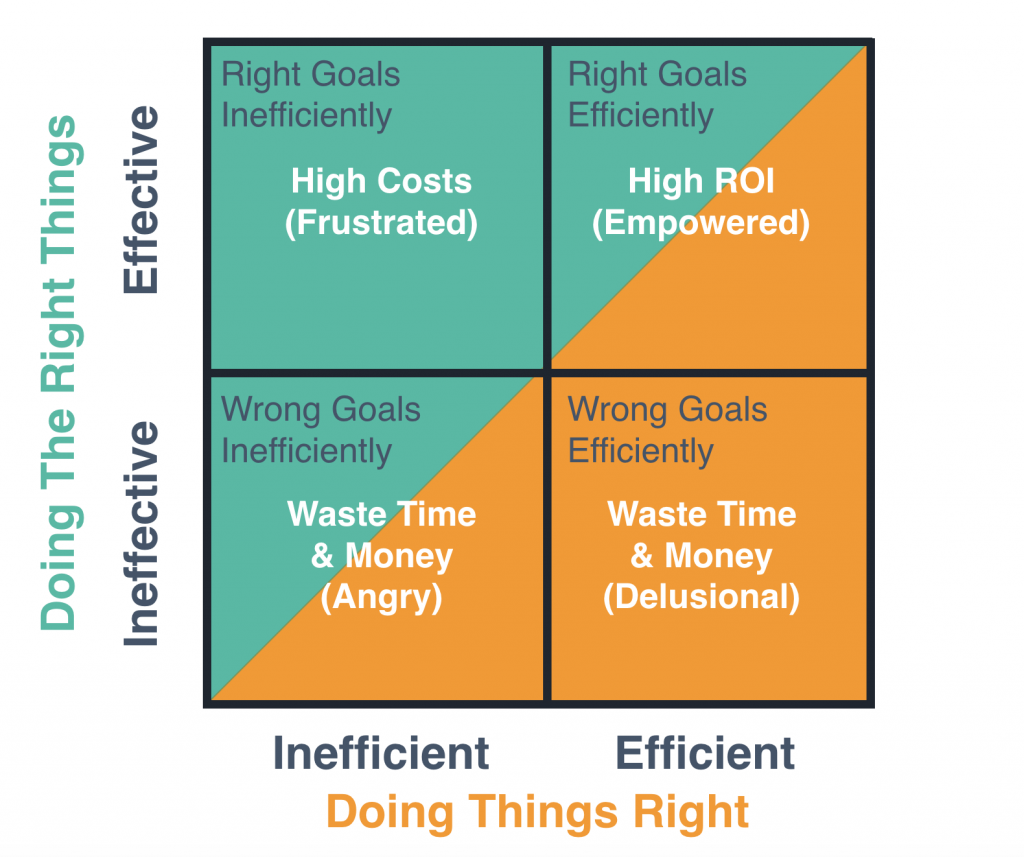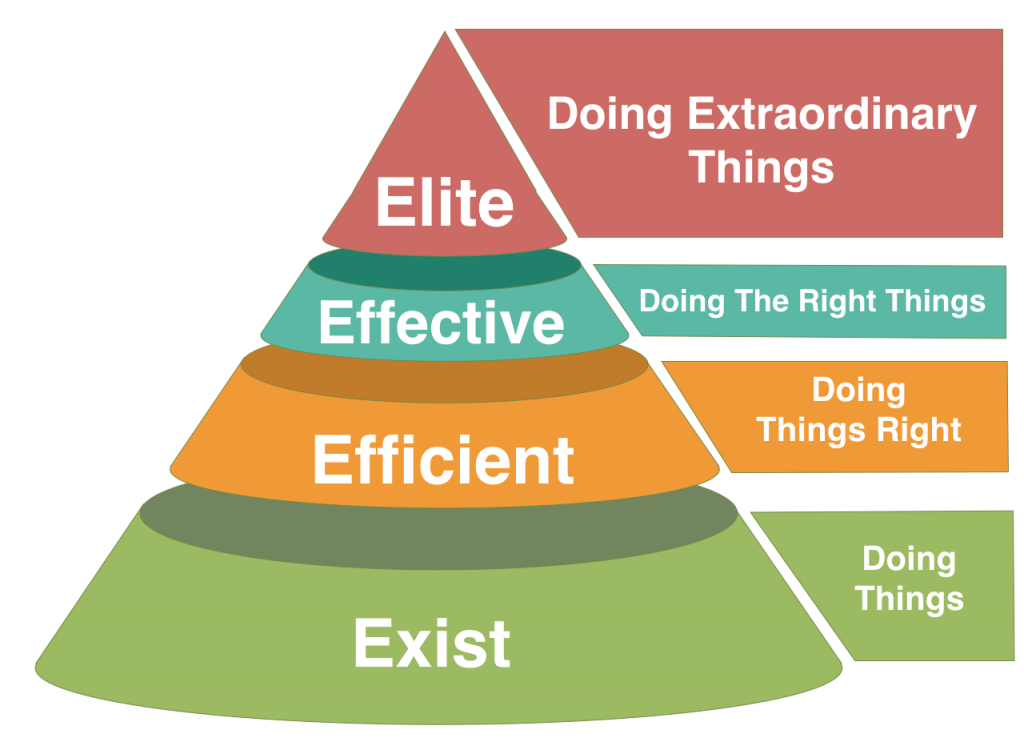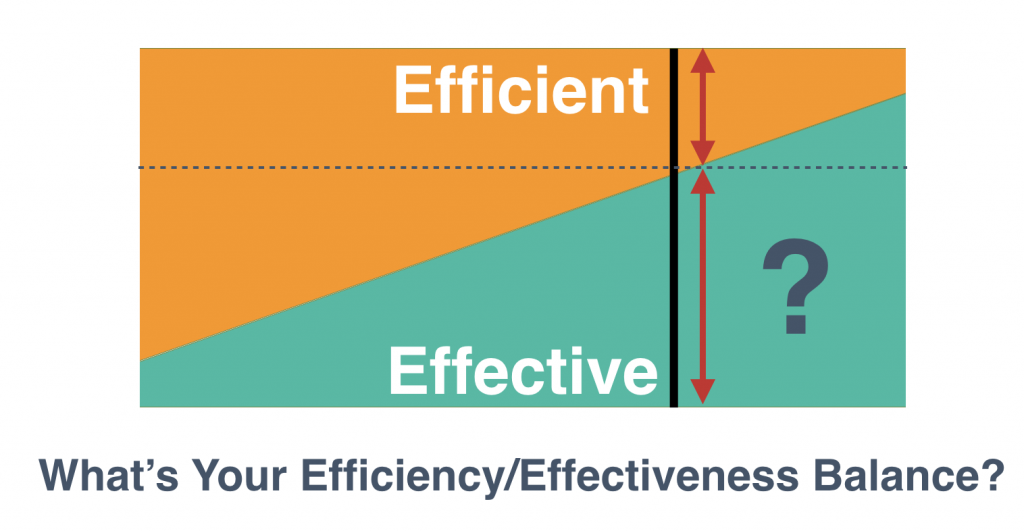
In This Episode…
Those who use the terms “Efficient” and “Effective” probably don’t appreciate they mean very different things. Certainly in the context of personal productivity, there is a big difference.
In this episode I explore both ideas and put them in the context of the workplace environment. To do that I introduce my concept of the Pyramid of Personal Productivity.
Edited Transcript
Hi, this is Michael Tipper and welcome to today’s episode of the Profit Productivity Podcast.
If you listened to the last episode, you’ll have heard me talk about the double standards of yesterday. On the one hand I made quite a lot of progress with one of my projects. But on the other hand I allowed myself to press the snooze button yesterday morning. I stayed in bed and didn’t do my normal morning routine.
That episode was recorded at five o’clock yesterday and at the time I was unhappy. Even though I’d made significant progress, I felt I’d let myself down by not getting up as I had planned. Well, last night I went on to complete all the tasks I’d set myself yesterday and more besides.
And although I ended up working until very late into the evening, I went to bed last night feeling very happy I’d compensated and recovered from the poor start to the day.
In fact it was probably one of the most productive days I’ve had in a long time. On that account, I was mulling over that maybe I should just miss my morning routine every day!
I’m not going to do that because my morning routine is an important part of the day.
I got up this morning and I was back into it and everything was fine.
So today, I want to share my thoughts on the differences between efficient and effective. Often they’re confused and people will say one word when they mean the other. I’m going to look at the two in the concept of productivity.
Let’s look at some dictionary definitions (taken from the Pocket Oxford English Dictionary 7th Edition). First of all, the word “effect” as a noun:
“…result or consequence or of action”.
But it can also be used as a verb when the definition is:
“…bring about accomplish or cause to occur.”
Here’s the definition of “effective” (adjective):
“… having an effect, powerful in effect; striking, remarkable; actual, existing; operative”.
Here’s the definition of “efficient””.
“…productive with minimum waste of effort”.
The dictionary definitions of the words are definitely different. I’ve been thinking about them in the context of personal productivity. There’s a nice little four box model that I think explains their relationship very well.

In the bottom left hand quadrant, you’ve got inefficient and ineffective. This is about setting the wrong goals and being inefficient in achieving them. That of course is a waste of both time and money and possibly leaves everyone involved feeling angry.
In the bottom right hand quadrant, activities are still ineffective, but now they are done efficiently. This might be working on the wrong goals but doing it efficiently. Again, a waste of time and money. People trapped in this quadrant might be delusional about the impact their efforts are having.
In the top left hand quadrant, the activities are now effective (perhaps working on the right goals) but they are carried out inefficiently. A consequence of this might be higher than necessary costs. The dominant emotion here might be frustration.
Then finally there is the top right hand quadrant. Here, efficient effort is being applied to the right goals – the perfect combination of effectiveness and efficiency. The net effect of doing this is probably a high return on investment probably accompanied by feelings of empowerment
To give some context to help understand the difference quadrants even better, consider them in relation to sales people.
In the bottom left hand quadrant, a sales person who’s ineffective and inefficient might be making a few really bad sales calls and taking a long time to do it. Their inefficiency might also arise because they’re calling anyone instead of just targeted prospects.
In the bottom right hand quadrant, someone in the sales team who is efficient but still ineffective, might be making lots of poor quality. Though they still might also be calls to the wrong people. Nevertheless, money still isn’t being made.
A salesperson in the top left hand quadrant is now making sales, but needs to spend a lot of time making calls to get those sales. The inefficiency in their approach might be because their conversion skills are poor, or because they are also calling people outside their target demographic.
The best salesperson will be someone who is both efficient and effective and they will live in the top right hand quadrant. More of this person’s calls are made to the right people, and their conversion rates are higher. So the return on their investment of time and effort is much higher.
So that’s just a simple way of looking at the difference between efficient and effective.
Now I’ve been thinking about them in the context of working in an organisation based on my own experience of doing that myself over my career. I’ve also been drawing on my experience of helping others be able to get more done in their work.
I’ve developed a four layer pyramid model of productivity in the workplace incorporating the levels of being efficient and effective but also two other levels often over looked.

I’ll now take a bit of time to describe the model put into context the differences between the various levels.
In terms of contributing to the output of an organisation, you will have people who just exist in the workplace. These will be people who are “doing things”.
At the next level up, will be people who are efficient in the workplace. These will be folks are “doing things right”.
At the next level up are people who are “doing the right things”. These are people I would describe as being effective.
I love this distinction between efficient – “doing things right” – and effective – “doing the right things” – because it is often used to differentiate Management – “doing things right” – and Leadership – “doing the right things”.
And finally at the top of the pyramid we have elite. These are people who are doing extraordinary things.
There are further ways of defining the people you might find at each of these levels.
Someone who just exists in the workplace is going to be your average Joe/Joanne.
[NOTE – I struggled with using “Joanne” because I worked with one of the most efficient and effective workers on my last team called Joanne. She’ll kill me when she reads this! But I like the alliteration (is that the right word?).]
Their approach to their work could be described as mediocre at best, ineffective at worst. They might be struggling at work and possibly even overwhelmed. Or they might just not care for the work they do and just turn up to receive their pay cheque and live for going home at the end of the day.
Now at the efficient level of work, you will find your good workers. These are people who are comfortable with their job, they’re satisfied with what they’re doing and the work gets done. These people are reliable and the organisation could not operate on a day to day basis without them.
People who operate at the effective level will be accomplished at the efficient level but have now moved on to achieve more. These tend to be the high performers. They’re motivated, they’re driven and they get important stuff done.
And finally at the very top of the pyramid, you have the elite. These are peak performers doing extraordinary things. They are often obsessed with their work. They’re driven, they’re passionate and don’t tolerate mediocrity. Often they’re bruised because they’re sometimes breaking new ground. They’re also often tired as well, because often they’re putting in a huge amount of effort.
Let’s now look at what differentiates each type of worker.
I’ll forget the “exist” layer for this bit because my model starts to fall apart a little. Originally I had intended citing high energy, good health and even fitness as pre-requisites for this level. I was doing so because they are solid foundations for the other level. However because the exist level isn’t one of significant levels of performance, I could’t attribute these qualities to this level.
Those who are efficient, are good workers doing things right. They tend to be people who focus on operating systems and processes. They take established ways of doing things and make them run smoothly.
Those who are effective in the workplace will strive for achievement. They’ll be about goals and planning and execution.
At the elite level, we are talking about people here with significant drive, innovation, creativity and leadership. Elite performance might be on an individual level – think Mo Salah scoring lots of goals for Liverpool. Or it might generating elite performance on a team level – think Jurgen Klopp coaching the entire Liverpool team of superstars.
How do you measure the performance of these different levels?
For people who exist in the workplace, it’s just about them showing up!
At the efficiency level, it’s about how fast something is done; how accurately something done; how cheaply something is done? Those are typical measures of efficiency.
This is what a lot of organisations become obsessed with because it’s very easy to see the numbers and calculate the efficiencies. You can reduce numbers, you can reduce budgets, you can look at percentages. Tangible savings are easy to make.
Unfortunately sometimes that focus is misplaced. I’ve often seen change initiatives rolled out in large chunks so they can be completed efficiently. Sweeping changes are imposed on large groups of people at the same time so things can be done in “one foul swoop”. Certainly changes are instigated quickly and efficiently, but rarely are they done effectively.
Measuring effective people is quite easy, because you can see what they’ve achieved, created, fixed etc.
At the elite level the measurement is a little more abstract. “Wow” as feedback is a good indication of someone who has performed at the elite level.
There is actually a fifth level below the existence level – that’s everyone else. If they are outside the organisation, then the only measure is “Do they have a pulse?” and “Are they breathing?”, what do they do?
Of course people don’t usually sit neatly in models like this. They are usually only put together to illustrate concepts and ideas. Most mid-level managers and leaders, and certainly people who run their own business, need to be both efficient and effective. The question to ask themselves, is what is the healthy balance between the two that best serves the needs of their current work?
This diagram here explains that more efficiently and more effectively than I could do in just words alone.

As with all things that contradict or oppose, it’s always a balance. There’s no real cut and dried way of looking at effectiveness and efficiency.
I like to think of it as difference between being relational and being transactional.
So for example, let’s take needing to communicate to a colleague in your organisation. Writing an email is very efficient. It’s easy to rapidly fire off a quick email to someone about something you’ve thought they need to know.
One of the problems we have is our brain rewards us for achieving anything by giving us a hit of dopamine. So we feel good about doing quickly knocking up a few words and despatching them with the push of a button.
However, it might be more effective to pick up the phone or even go and meet them face to face to communicate the same thing.
That may take longer, but the benefits of the human contact on the quality of the relationship might be priceless. You could be laying down the foundations for a stronger relationship to allow you to get even more done in the future. You might also realise in the interaction there’s greater depths to the communication necessary then you’d have known if you’d just had an email exchange.
That’s a powerful example of the difference between efficient and effective.
I’m trying to fight my tendency to be quite black and white about things as I express my thoughts here. I’ve laid them out like this to help me understand how they link together and it’s probably isn’t as black and white as I’ve made it out to be.
My experience of reality is there are different levels of productivity at the individual level in an organisation.
Things will get done and if you get them done efficiently, they’re going to be done right. Things can be done effectively but it requires a slightly different mindset in my opinion. And then at the top level, elite performance is about doing extraordinary things.
So there’s my thoughts on effectiveness and efficiency. It’s something that has been of interest to me for a long time because I’m a process guy, I’m a systems guy. I think logically and I like to think in numbers.
For that reason I’m always quite focused on efficiency and as I’ve matured into getting more done, I’ve matured into being more effective over the years. It has been interesting watching my development as I’ve moved from just doing things right to starting to do the right things.
I’ve even pushed towards doing extraordinary things because that is my goal, and I hope it’s yours too.
Until tomorrow.